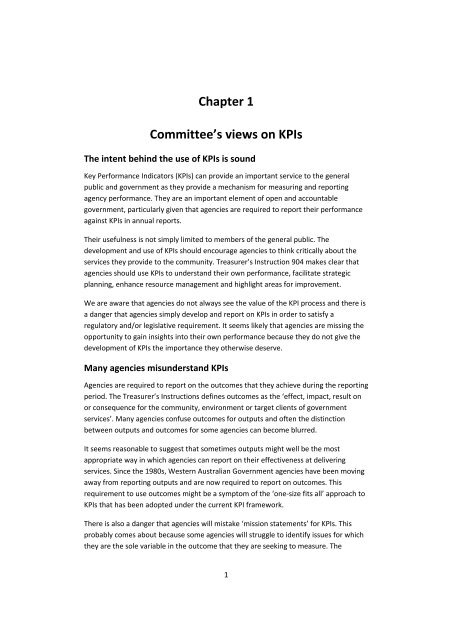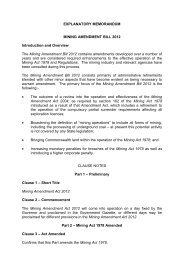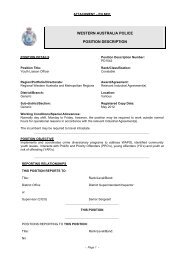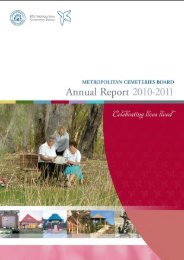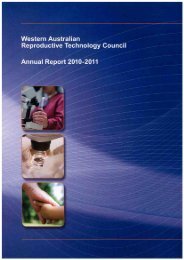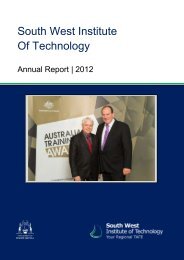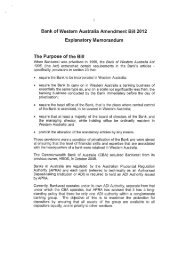Key Performance Indicators - Parliament of Western Australia
Key Performance Indicators - Parliament of Western Australia
Key Performance Indicators - Parliament of Western Australia
You also want an ePaper? Increase the reach of your titles
YUMPU automatically turns print PDFs into web optimized ePapers that Google loves.
Chapter 1<br />
Committee’s views on KPIs<br />
The intent behind the use <strong>of</strong> KPIs is sound<br />
<strong>Key</strong> <strong>Performance</strong> <strong>Indicators</strong> (KPIs) can provide an important service to the general<br />
public and government as they provide a mechanism for measuring and reporting<br />
agency performance. They are an important element <strong>of</strong> open and accountable<br />
government, particularly given that agencies are required to report their performance<br />
against KPIs in annual reports.<br />
Their usefulness is not simply limited to members <strong>of</strong> the general public. The<br />
development and use <strong>of</strong> KPIs should encourage agencies to think critically about the<br />
services they provide to the community. Treasurer’s Instruction 904 makes clear that<br />
agencies should use KPIs to understand their own performance, facilitate strategic<br />
planning, enhance resource management and highlight areas for improvement.<br />
We are aware that agencies do not always see the value <strong>of</strong> the KPI process and there is<br />
a danger that agencies simply develop and report on KPIs in order to satisfy a<br />
regulatory and/or legislative requirement. It seems likely that agencies are missing the<br />
opportunity to gain insights into their own performance because they do not give the<br />
development <strong>of</strong> KPIs the importance they otherwise deserve.<br />
Many agencies misunderstand KPIs<br />
Agencies are required to report on the outcomes that they achieve during the reporting<br />
period. The Treasurer’s Instructions defines outcomes as the ‘effect, impact, result on<br />
or consequence for the community, environment or target clients <strong>of</strong> government<br />
services’. Many agencies confuse outcomes for outputs and <strong>of</strong>ten the distinction<br />
between outputs and outcomes for some agencies can become blurred.<br />
It seems reasonable to suggest that sometimes outputs might well be the most<br />
appropriate way in which agencies can report on their effectiveness at delivering<br />
services. Since the 1980s, <strong>Western</strong> <strong>Australia</strong>n Government agencies have been moving<br />
away from reporting outputs and are now required to report on outcomes. This<br />
requirement to use outcomes might be a symptom <strong>of</strong> the ‘one‐size fits all’ approach to<br />
KPIs that has been adopted under the current KPI framework.<br />
There is also a danger that agencies will mistake ‘mission statements’ for KPIs. This<br />
probably comes about because some agencies will struggle to identify issues for which<br />
they are the sole variable in the outcome that they are seeking to measure. The<br />
1


